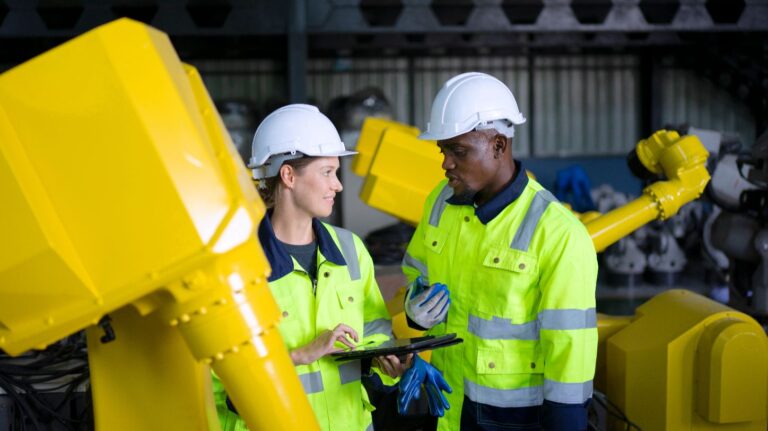A new report from Make UK has revealed that, despite being the world’s sixth-largest economy, the UK has slipped in global innovation rankings and ranks just 24th in robotic density.
It notes that while the UK ranked second on the WIPO Global Innovation Index (GII) in 2015, it dropped to the fourth spot by 2020, and again to fifth in 2024.
The GII is an annual report published by the World Intellectual Property Organization (WIPO). It ranks the innovation performance of around 130 economies worldwide.
In the past decade, the UK has been overtaken by Sweden, the US and Singapore, while Switzerland has remained in the top spot since 2015.
On top of this, the Make UK report shows that the UK is also lagging behind in terms of global robot density, with just 112 industrial robots per 10,000 manufacturing workers.
For comparison, latest available data shows the average robot density across the European Union is 208 units per 10,000 employees, and the worldwide average is 151 units per 10,000 employees.
South Korea leads the table for robot density by some distance, with an average of 1,012 robots per 10,000 workers. Singapore follows with 730 robots per 10,000 workers.
In fact, Asian countries make up four of the top five countries globally for robot density, with Japan and China joining South Korea and Singapore. The only European country to make the top five is Germany, which sits at the number-three spot.
The report adds that while 70% of manufacturers are investing in digital tools, only 10% operate fully digital factories.
Dr Séamus Nevin, chief economist at Make UK, commented: “Time and again, we hear from small and medium-sized manufacturers that they’re keen to adopt new technologies, but are being held back by fragmented support, complex funding systems and a lack of accessible, appropriate digital skills training.
“If we want to unlock a £150 billion boost to UK gross domestic product (GDP) by 2035, we must make it easier for SMEs to adopt automation and AI.”
Make UK’s report concludes that – unlike economies such as Germany, the US, Singapore, South Korea and Switzerland which have pursued ‘integrated, long-term strategies aligning public R&D investment, workforce development, and industrial policy’ – the UK ‘has often lacked the institutional coherence and
policy continuity required’ to match the performance of its peers.
It claims that ‘only by placing SMEs at the heart of this automation and digitalisation agenda, and backing them with a coherent, long-term ecosystem of support, can the UK unlock its full manufacturing potential and deliver a more resilient, inclusive and technologically future-ready economy’.
In response to the report, Adrian Negoita, co-founder and chief technical officer at robotics company Dexory, said: “Robots won’t save UK manufacturing, people will. The Make UK report proves a harsh reality – as global competitors push ahead with automation and AI, Britain is falling behind. Not because we lack the technology but because we don’t have the skills base nor enough people who know how to use AI. It’s a critical gap.
“We need a national skills blitz. We must flood the pipeline with robotics-savvy engineers, retrain workforces to work alongside AI and ensure SMEs get practical support to adopt new technologies. That means school-to-work bootcamps, advanced manufacturing apprenticeships and making AI and automation a core part of the curriculum.
“Without this, our global standing will keep sliding. With it, we power a high-skill, future-proof manufacturing sector, and put the UK back on top.”
For more on the UK manufacturing sector and an exclusive interview with an automation expert from the University of Sheffield’s Advanced Manufacturing Research Centre, check out this feature from the June 2025 issue of Logistics Manager!







